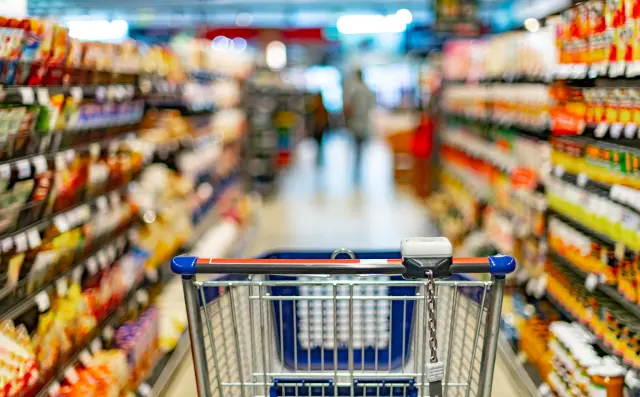
The rise of ultra-processed foods (UPFs) worldwide poses a major public health threat that is displacing fresh food.
This the warning of a three-paper series published in The Lancet by 43 global experts who say that the onus to improve diets should not be placed on the individual—but governments and corporate companies, who must reduce UPF production, marketing and consumption and improve accessibility to healthy food.
UPFs refer to heavily processed foods and drinks that often include ingredients like preservatives, sweeteners and emulsifiers.
“The easiest way is to say that you can’t make it in your home kitchen because it requires industrial production and industrially produced additives,” Marion Nestle, New York University professor of food, nutrition, and public health, told Newsweek.
“Ultra-processed diets induce people to eat more calories without realizing it. That’s the basic problem.”
“Addressing this challenge requires governments to step up and introduce bold, coordinated policy action—from including markers of UPFs in front-of-package labels to restricting marketing and implementing taxes on these products to fund greater access to affordable, nutritious foods,” added professor Camila Corvalan of the University of Chile.
The first paper reviews scientific evidence on UPFs and health, presenting evidence they are displacing long-established dietary patterns, worsening diet quality and are associated with an increased risk of multiple chronic diet-related diseases, according to the team.
These include obesity, type 2 diabetes, cardiovascular disease, depression and early death from all causes.
National surveys included estimated energy contribution of UPFs to total household food purchases or daily food intake tripled in Spain (11 percent to 32 percent) and China (4 percent to 10 percent) over the last three decades. It increased (10 to 23 percent) in Mexico and Brazil over the previous four decades.
In the U.S. and U.K., it increased slightly over the last two decades, maintaining levels above 50 percent, the researchers report.
Further evidence reviewed shows diets high in UPFs are linked to overeating, higher exposure to harmful chemicals and additives and poor nutritional quality with many of these foods containing too much sugar, unhealthy fats and too little fiber and protein.

The authors acknowledge and welcome scientific critiques of how ultra-processed are defined by Nova, including the lack of long-term clinical and community trials, an emerging understanding of mechanisms and the existence of subgroups with different nutritional values.
“Ultra-processed foods (UPFs), as defined by the Nova food classification system, are novel branded products made from cheap food-derived substances and additives, designed and marketed to displace real food and freshly prepared meals, while maximising industry profits,” study author Chris van Tulleken, chair in infection and global health at University College London, told Newsweek.
The authors argue, however, that we can not wait to fill in research gaps before public health action is taken based on what we do know.
While some experts argue not all UPFs are created equally and not all are ‘bad,’ Nestle said, “All seem to encourage overeating, even when they are supposedly healthier.
“This was shown in a clinical trial in Great Britain recently. Even when people were losing weight, those on the ultra-processed diets lost less weight than those on minimally processed diets.”
“UPF bread is not equivalent to UPF chocolate but comparing these products seems absurd since they are not used interchangeably in diet,” added van Tulleken.
“In many countries UPF forms the staples of the diet—ready meals, supermarket bread, yoghurts, ready meals, breakfast cereals. While some may be less harmful than others it’s important to consider diet as a whole and a big concern is that UPFs are displacing healthier foods and that almost all of these products have high levels of calories, fat, salt, sugar.”
The second paper in the series focuses on policies and regulations that could help reduce UPF production, marketing and consumption.
“Dietary guidelines should suggest eating less ultra-processed food. We should also tax and put warning labels on them, and stop companies from marketing them, especially to children,” said Nestle.
For example, as well as regulation, taxing certain UPFs to fund fresh food subsidies for low-income households could help provide a more accessible and healthier alternative.
The third paper explains exactly how global corporations and not individual choices are driving the rise of UPFs by using cheap ingredients and industrial methods to cut costs, “aggressive marketing” and appealing designs. In essence, vulnerable individuals may not realise their so-called food choices may have been influenced or that they have been targeted, while certain types may be more addictive than whole foods.
With global annual sales of $1.9 trillion, UPFs are the most profitable food sector, according to the researchers. UPF manufacturers alone account for over half of $2.9 trillion in shareholder payouts by all publicly listed food companies since 1962.
Profits are also protected with political tactics like blocking regulations and shaping scientific debate and public opinion, according to evidence in the series.
The study authors call for a coordinated global public health response, a global UPFs action advocacy network and a different vision for our food systems that support local producers, preserve cultural traditions, promote gender equality and ensure communities benefit from profit.
“By this time, the evidence is strong and consistent, and calls for action,” said Nestle.
Do you have a tip on a health story that Newsweek should be covering? Do you have a question about healthy eating? Let us know via health@newsweek.com.
References
Baker, P., Slater, S., White, M., Wood, B., Contreras, A., Corvalán, C., Gupta, A., Hofman, K., Kruger, P., Laar, A., Lawrence, M., Mafuyeka, M., Mialon, M., Monteiro, C. A., Nanema, S., Phulkerd, S., Popkin, B. M., Serodio, P., Shats, K., Van Tulleken, C., & Barquera, S. (2025). Towards unified global action on ultra-processed foods: Understanding commercial determinants, countering corporate power, and mobilising a public health response. The Lancet. https://doi.org/10.1016/S0140-6736(25)01567-3
Monteiro, C. A., Louzada, M. L. C., Steele-Martinez, E., Cannon, G., Andrade, G. C., Baker, P., Bes-Rastrollo, M., Bonaccio, M., Gearhardt, A. N., Khandpur, N., Kolby, M., Levy, R. B., Machado, P. P., Moubarac, J.-C., Rezende, L. F. M., Rivera, J. A., Scrinis, G., Srour, B., Swinburn, B., & Touvier, M. (2025). Ultra-processed foods and human health: The main thesis and the evidence. The Lancet. https://doi.org/10.1016/S0140-6736(25)01565-X
Scrinis, G., Popkin, B. M., Corvalan, C., Duran, A. C., Nestle, M., Lawrence, M., Baker, P., Monteiro, C. A., Millett, C., Moubarac, J.-C., Jaime, P., & Khandpur, N. (2025). Policies to halt and reverse the rise in ultra-processed food production, marketing, and consumption. The Lancet. https://doi.org/10.1016/S0140-6736(25)01566-1
